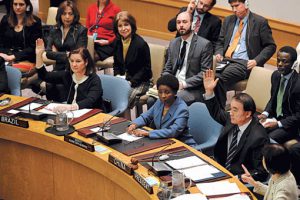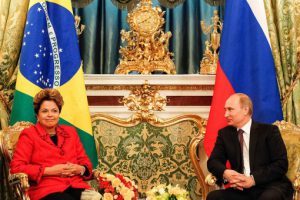
Arts Innovator: Francisca Valenzuela, Chile
Singer. Fashion designer. Entrepreneur. At 27, Francisca Valenzuela has already reached the kind of success usually associated with a professionally managed career. But instead of a top agent or a big record label, the San Francisco-born Chilean artist owes her achievements to a team that includes her mother, biochemist Bernardita Méndez, her boyfriend and artistic … Read more

Too often, especially in emerging economies, the exorbitant investment necessary to prepare for these events goes to projects with little long-term economic value.
The World Cup, the Olympics and other mega sports events give cities and countries the opportunity to be in the world’s spotlight for several weeks. And the competition among cities to host these events can be as fierce as the competition among the athletes themselves. Bids that had traditionally gone to wealthier countries have recently … Read more

The urgency and scale of hosting can provide a needed boost to public investment and transform a country’s image, infrastructure and business conditions beyond the games.
In the next two years, Brazil will host the three largest mega sports events in the world: the 2014 FIFA World Cup this summer, and then the Summer Olympics and Paralympics in Rio in 2016. Other nations in the Americas and across the globe will be watching to see if Brazil’s hosting duties lead to … Read more
Monday Memo: New Bogotá Mayor – Argentine Debt Case – Illegal Mining – Venezuela – García Márquez
This week’s likely top stories: María Mercedes Maldonado becomes Bogotá’s new mayor; the U.S. Supreme Court hears arguments in the Republic of Argentina v. NML Capital case; the deadline passes to regulate illegal mining in Peru; rallies in Venezuela turn violent; Gabriel García Márquez’ memorial service is held in Mexico City. Santos Names Interim Mayor … Read more

Speaking a Common Language with Latin America: Economics
United States-Latin American relations have often suffered from a disconnect. While we stress security issues, the region’s leaders speak of poverty reduction and trade. They resent being seen as afterthoughts to U.S. policies focused elsewhere. As a result, the region is sporadically open to new suitors, such as Spanish investors 15 years ago, or the … Read more
Contested Lands, Contested Laws
Read more about proposals for regulation here. The right to free, prior and informed consent (FPIC), or consulta previa, has expanded throughout South America. Nine states have ratified the International Labour Organization’s Convention 169 (ILO169)—the principal treaty regarding consulta previa.* But regulations created by four of those states—Colombia, Chile, Peru, and Ecuador—contradict the commitments they … Read more

International Cooperation or Gridlock?
A shift of the global balance of power is under way. Emerging countries are increasingly playing significant roles on global issues, such as the global economy, trade, and investment, as well as in diplomacy and multilateral decision making. In a few years, we will witness a historically rare phenomenon, when a new country will become … Read more
Brazil Sends Troops to Bahia After Police Strike
The Brazilian government sent 2,500 troops to the city of Salvador on Wednesday after a police strike led to looting and attacks on public transportation. Salvador, the capital of the northeastern state of Bahia, is set to host six matches during the World Cup this June. The police strike, over higher pay and better working … Read more
Security or Counterinsurgency in Rio favelas?
In anticipation of the 2014 World Cup, the Brazilian government enacted a policy to have special units of police occupy favelas in Rio de Janeiro. As of last week, one of Rio’s most dangerous shanty towns, Complexo da Maré, was taken over by close to 3,000 Brazilian troops. The shift—from using the elite Unidade de … Read more
The Havana Film Festival in New York Celebrates 15 Years
Since 2000, the Havana Film Festival in New York has been bringing Latin American cinema to New Yorkers—and after 15 years, it is still going strong. Despite its name, the festival doesn’t limit itself to showing Cuban films. Its goal, said creative director Diana Vargas, is to place Cuba within a larger Latin American context … Read more
Argentine Unions Stage Nationwide Strike
Parts of Argentina were paralyzed on Thursday after the country’s biggest unions shut down transportation and blocked entrances to Buenos Aires. The unions are staging a 24-hour strike to protest rising inflation and cuts to government subsidies, and are currently negotiating wage increases. Industrial unions—including metal and oil workers allied with President Cristina Fernández de … Read more
Ten Sentenced in Argentine Sex Trafficking Case
Ten individuals suspected of the kidnapping and sexual exploitation of Maria de los Ángeles “Marita” Verón were sentenced to prison in Tucumán, Argentina on Tuesday. While walking to a doctor’s appointment in 2002, Verón, 23, disappeared, and was suspected to have been forced into a sex trafficking ring. All 13 individuals accused of being involved … Read more
Modernizing Brazil’s Ports: A Plan for 2014
Brazil’s Minister of Ports, Antônio Henrique Pinheiro Silveira stopped in Washington, D.C. last week on his hemispheric road-show to present the details of Brazil’s latest port modernization efforts. In June of 2013, the Brazilian government passed new regulatory reform laws for ports, in hopes of modernizing current infrastructure, increasing efficiencies and driving competition. Since 2005, … Read more
Monday Memo: Costa Rican Elections – U.S. Deportations – Venezuela-Spain Spat – FIFA Delays
Unchallenged Costa Rican Candidate Wins Presidency: Luis Guillermo Solís of the Partido Acción Ciudadana (Citizen Action Party—PAC) won Sunday’s presidential election in Costa Rica, claiming 78 percent of the vote. The challenging candidate, Johnny Araya of the Partido Liberación Nacional (National Liberation Party—PLN), dropped out of the running after a March 5 opinion poll ranked … Read more

The Ukrainian Crisis and Latin America
Dynamics within the Ukraine are forcing reconsideration of an old concept in international politics–the sphere of influence. Russian President Vladimir Putin has not hesitated in saying that Russia has interests in the Ukraine, reserving the right to use force. Some Latin American governments have spoken out against the dismissal of former Ukrainian President Viktor Yanukovych … Read more


